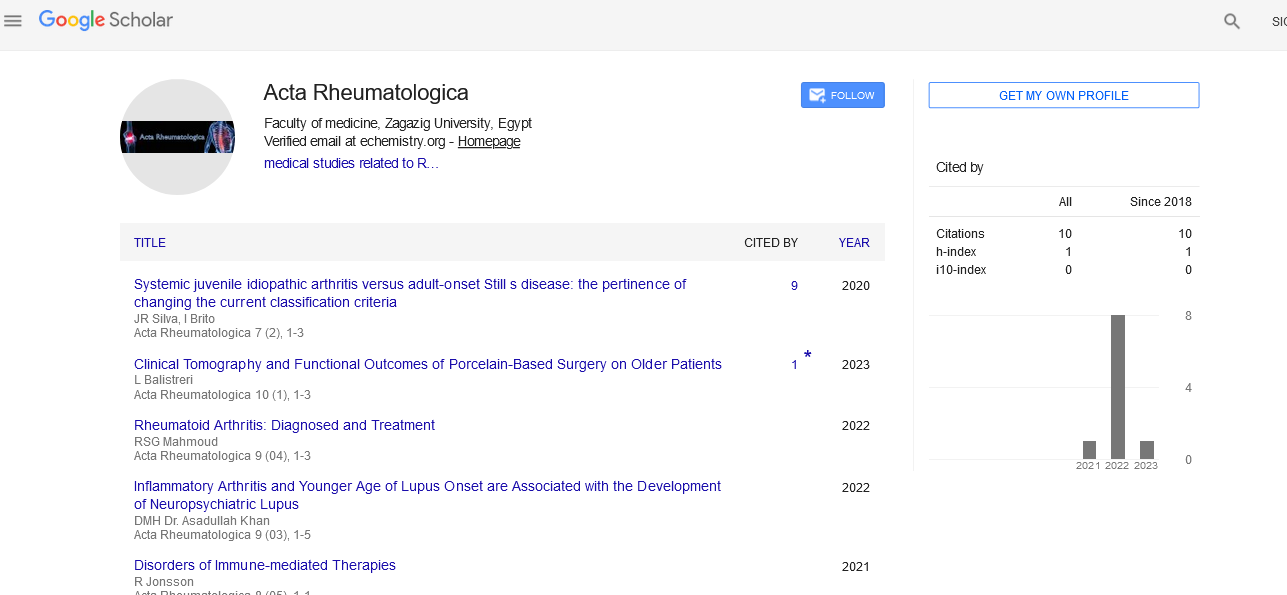Perspective - (2025) Volume 12, Issue 1
Lifestyle Modifications: A Pathway to Health and Longevity
Sara J Brown*
Department of Rheumatology, University College London, England
*Correspondence:
Sara J Brown, Department of Rheumatology, University College London,
England,
Email:
Received: 03-Feb-2025, Manuscript No. IPAR-25-15556;
Editor assigned: 06-Feb-2025, Pre QC No. IPAR-25-15556 (PQ);
Reviewed: 21-Feb-2025, QC No. IPAR-25-15556;
Revised: 03-Mar-2025, Manuscript No. IPAR-25-15556 (R);
Published:
12-Mar-2025
Introduction
Lifestyle modifications refer to changes in daily habits and
behaviors aimed at improving overall health and well-being.
These modifications play a crucial role in preventing and
managing chronic diseases such as diabetes, hypertension,
cardiovascular diseases, and obesity. By adopting a healthier
lifestyle, individuals can enhance their quality of life, boost
longevity, and reduce healthcare costs.
This article explores the importance of lifestyle modifications,
key areas of focus, and practical strategies to implement lasting,
positive changes.
Description
The importance of lifestyle modifications
Lifestyle choices significantly impact health outcomes. Poor
dietary habits, physical inactivity, smoking, excessive alcohol
consumption, and stress contribute to numerous chronic
conditions. By making targeted lifestyle changes, individuals can:
• Reduce the risk of chronic diseases.
• Improve mental health and emotional well-being.
• Enhance physical fitness and mobility.
• Increase energy levels and productivity.
• Strengthen immune function.
• Promote longevity.
Key areas of lifestyle modifications
Lifestyle modifications encompass several aspects of daily life,
each contributing to overall health. The most critical areas
include:
Healthy nutrition: A balanced diet is fundamental to good
health. Proper nutrition supports bodily functions, prevents
deficiencies, and reduces the risk of chronic illnesses. Key
dietary modifications include:
• Consuming more fruits, vegetables, whole grains, and lean
proteins.
• Reducing processed and sugary foods.
• Controlling portion sizes.
• Staying hydrated by drinking sufficient water.
• Limiting sodium and unhealthy fats.
Regular physical activity: Exercise plays a vital role in
maintaining a healthy weight, strengthening muscles and bones,
and reducing the risk of diseases. Recommended modifications
include:
• Engaging in at least 150 minutes of moderate-intensity
exercise per week.
• Incorporating strength training exercises twice a week.
• Reducing sedentary behavior by standing or moving more
throughout the day.
• Choosing enjoyable activities like walking, swimming, or
dancing.
Stress management: Chronic stress negatively impacts
physical and mental health, increasing the risk of anxiety,
depression, and heart disease. Effective stress management
strategies include:
• Practicing mindfulness and meditation.
• Engaging in hobbies and recreational activities.
• Maintaining a positive social support system.
• Prioritizing work-life balance.
• Practicing deep breathing and relaxation techniques.
Quality sleep: Sleep is essential for cognitive function,
emotional regulation, and physical health. Sleep modifications
include:
• Maintaining a consistent sleep schedule.
• Avoiding screen time before bed.
• Creating a comfortable sleep environment.
• Reducing caffeine and heavy meals before bedtime.
• Practicing relaxation techniques to improve sleep quality.
Smoking cessation and alcohol moderation: Tobacco and
excessive alcohol consumption are leading causes of preventable
diseases. Recommended lifestyle changes include:
• Seeking professional help or support groups for smoking cessation.
• Using nicotine replacement therapy if necessary.
• Limiting alcohol intake to moderate levels (one drink per day
for women, two for men).
• Substituting alcohol with healthier alternatives like herbal tea
or infused water.
Maintaining a healthy weight: Obesity is linked to several
health complications, including diabetes, heart disease, and joint
problems. Weight management strategies include:
• Combining healthy eating with regular exercise.
• Setting realistic weight loss goals.
• Tracking progress and maintaining accountability.
• Seeking guidance from nutritionists or health professionals.
Social and mental well-being: A fulfilling social life
contributes to emotional stability and overall happiness. Strategies
to improve social well-being include:
• Engaging in community activities.
• Spending quality time with family and friends.
• Developing new hobbies and interests.
• Seeking therapy or counseling when needed.
Implementing lifestyle modifications successfully
Making lifestyle changes can be challenging, but adopting a
structured approach increases the likelihood of success. Key
steps include:
Setting realistic goals
Start with small, achievable changes rather than drastic
overhauls. Setting SMART (Specific, Measurable, Achievable,
Relevant, Time-bound) goals can help track progress effectively.
Creating a support system
Having a strong support system, including family, friends, or
healthcare professionals, can help individuals stay motivated
and accountable.
Establishing healthy habits
Forming long-term habits requires consistency and repetition.
Gradually integrating new behaviors into daily routines helps
solidify lasting changes.
Monitoring progress
Tracking improvements in diet, exercise, and mental well-being
provides motivation. Journals, fitness apps, and regular
check-ups can assist in monitoring progress.
Staying flexible and adapting: Setbacks are a natural part of
lifestyle modification. Adjusting strategies as needed and
maintaining a positive mindset can help overcome challenges.
The role of healthcare professionals in lifestyle
modifications
Healthcare providers play a vital role in guiding patients
through lifestyle changes. Physicians, dietitians, physical
therapists, and mental health professionals offer expertise in:
• Personalized health assessments and recommendations.
• Providing educational resources and counseling.
• Developing structured plans for nutrition, exercise, and stress
management.
• Monitoring patient progress and making necessary
adjustments.
Conclusion
Lifestyle modifications are essential for maintaining optimal
health, preventing diseases, and enhancing overall well-being.
By making informed choices about diet, physical activity, stress
management, sleep, and social interactions, individuals can
significantly improve their quality of life. While adopting
healthier habits requires effort and persistence, the long-term
benefits far outweigh the challenges. With a proactive approach
and support from healthcare professionals, anyone can achieve
a healthier, more fulfilling life.





